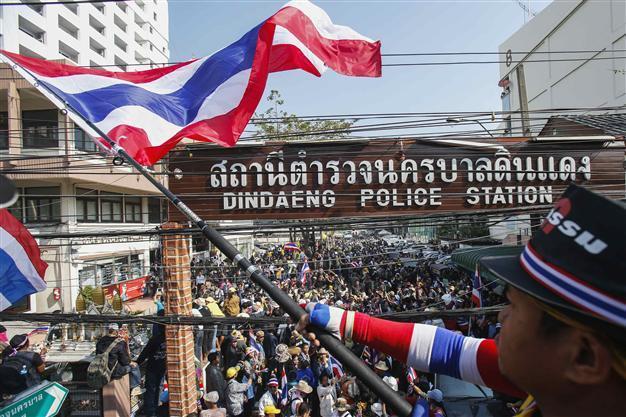Thai protesters step up campaign to disrupt elections
BANGKOK - Agence France-Presse

Anti-government protesters rally at the Dindang police station, near the Thai-Japan Youth Stadium in Bangkok December 23, 2013. REUTERS Photo
Thai opposition protesters on Monday stepped up their campaign to disrupt upcoming elections, trying to block candidate registrations as part of efforts to banish Prime Minister Yingluck Shinawatra and her family from politics.
The main opposition Democrat Party, which has not won an elected majority in parliament in about two decades, has vowed to boycott the February 2 polls called by Yingluck following weeks of street rallies by her opponents.
It is the latest chapter in a years-old political crisis which broadly pits a Bangkok-based elite against mostly rural and poor supporters of Yingluck and her brother Thaksin Shinawatra, a divisive former premier who was ousted in a coup in 2006.
Hundreds of demonstrators on Monday surrounded a stadium in Bangkok where representatives of political parties were trying to register to run in the polls ahead of the December 27 deadline.
Nine parties, including Yingluck's Puea Thai, managed to enter although officials were unable to fully complete their registration, according to the country's Election Commission.
About two dozen parties filed complaints with the police because they were prevented from entering.
But it appeared to be only a temporary setback with the election authorities expressing confidence that the parties would be able to register in time.
"For those parties that cannot enter the stadium we will contact them and made appointments for them to submit documents," Election Commissioner Dhirawat Dhirarojvit told AFP.
Puea Thai party said that Yingluck was on top of the party's list of candidates -- a position that would usually make her Puea Thai's pick for prime minister if it wins the polls.
Her candidacy is certain to anger the demonstrators, who want to rid Thai politics of the influence of her brother Thaksin -- a billionaire tycoon turned premier whom protesters accuse of controlling the government from his home in Dubai.
At least 150,000 people joined the latest anti-Thaksin mass protest in the capital on Sunday, according to an estimate from National Security Council chief Paradorn Pattanatabut. Organisers said the turnout was much higher.
Protest leader Suthep Thaugsuban has vowed to "shut the country down" to prevent people voting.
The demonstrators' self-proclaimed People's Democratic Reform Committee is calling for an unelected "people's council" to be installed to oversee sweeping but loosely-defined reforms before new elections in around a year to 18 months.
They have vowed to rid Thailand of the "Thaksin regime" and oppose the election, saying it will only bring another government allied to the former premier, who fled the country in 2008 to avoid jail for a corruption conviction he contends is politically motivated.
Thaksin's "Red Shirt" supporters have voiced fears that the recent protests are aimed at encouraging the military to seize power, in a country which has seen 18 successful or attempted coups since 1932.
The protesters "want to push Thailand into deadlock and then invite the military to seize power in a coup before the election", said one of the Red Shirt leaders, Nattawut Saikuar.
But if that happens "people will come out to fight back", he warned.
Thaksin is adored among rural communities and the working class, particularly in the north and northeast. But the billionaire tycoon-turned-politician is reviled by the elite, who see him as corrupt and a threat to the revered monarchy.
Pro-Thaksin parties have won every election since 2001 and Thailand has seen several bouts of political turmoil since he was deposed, with rival protests sometimes resulting in bloody unrest.
On Saturday members of the opposition Democrat Party -- who earlier resigned as MPs en masse to join the street demonstrations -- voted against participating in the elections.
The Democrats previously boycotted elections in 2006, helping to create the political uncertainty which heralded a military coup that ousted Thaksin.
The party last took power in 2008 by parliamentary vote after a court stripped Thaksin's allies of power, angering his "Red Shirt" supporters who launched mass street protests three years ago that ended in a military crackdown that left dozens dead.
Democrat leader and former premier Abhisit Vejjajiva has been indicted for murder over the crackdown along with his ex-deputy Suthep Thaugsuban who is leading the street protests.
